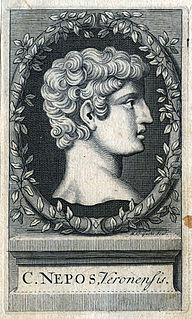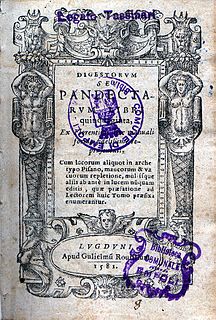Related Research Articles

Cornelius Nepos was a Roman biographer. He was born at Hostilia, a village in Cisalpine Gaul not far from Verona.

The gens Licinia was a celebrated plebeian family at ancient Rome, which appears from the earliest days of the Republic until imperial times, and which eventually obtained the imperial dignity. The first of the gens to obtain the consulship was Gaius Licinius Calvus Stolo, who, as tribune of the plebs from 376 to 367 BC, prevented the election of any of the annual magistrates, until the patricians acquiesced to the passage of the lex Licinia Sextia, or Licinian Rogations. This law, named for Licinius and his colleague, Lucius Sextius, opened the consulship for the first time to the plebeians. Licinius himself was subsequently elected consul in 364 and 361 BC, and from this time, the Licinii became one of the most illustrious gentes in the Republic.
Masurius Sabinus, also Massurius, was a Roman jurist who lived in the time of Tiberius. Unlike most jurists of the time, he was not of senatorial rank and was admitted to the equestrian order only rather late in life, by virtue of his exceptional ability and imperial patronage. Masurius was the first person to give "state-certified opinions" (publice respondere), a privilege granted by the emperor which marked increasing imperial control over the judicial process after the end of the Roman Republic. Before the Principate of Augustus, the value of legal opinions was based on the expertise of those who gave them. The passage in the Digest of Justinian that discusses the granting of Masurius's authority is thus a pivotal point in the history of Roman law.
Critolaus of Phaselis was a Greek philosopher of the Peripatetic school. He was one of three philosophers sent to Rome in 155 BC, where their doctrines fascinated the citizens, but scared the more conservative statesmen. None of his writings survive. He was interested in rhetoric and ethics, and considered pleasure to be an evil. He maintained the Aristotelian doctrine of the eternity of the world, and of the human race in general, directing his arguments against the Stoics.
Marcus Porcius Cato Licinianus was son of Cato the Censor by his first wife Licinia, and thence called Licinianus, to distinguish him from his half-brother, Marcus Porcius Cato Salonianus, the son of Salonia. He was distinguished as a jurist.
The gens Terentia was a plebeian family at ancient Rome. Dionysius mentions a Gaius Terentilius Arsa, tribune of the plebs in 462 BC, but Livy calls him Terentilius, and from inscriptions this would seem to be a separate gens. No other Terentii appear in history until the time of the Second Punic War. Gaius Terentius Varro, one of the Roman commanders at the Battle of Cannae in 216 BC, was the first to hold the consulship. Members of this family are found as late as the third century AD.
Lucius Octavius Cornelius Publius Salvius Iulianus Aemilianus, generally referred to as Salvius Iulianus, or Julian the Jurist, or simply Iulianus, was a well known and respected jurist, public official, and politician who served in the Roman imperial state. Of north African origin, he was active during the long reigns of the emperors Hadrian, Antoninus Pius, and Marcus Aurelius, as well as the shorter reign of Marcus Aurelius' first co-Emperor, Lucius Verus.
Sextus Pedius was a Roman jurist during the late first and early second centuries. He was a contemporary to the Roman Jurists Aulus Ofilius and Massurius Sabinus, and also mentioned in the writings of Pomponius.
Aulus Ofilius was a Roman jurist of Equestrian rank, who lived in the Roman Republic. He is named as a jurist by Pomponius. Ofilius was a friend to Roman statesman Marcus Tullius Cicero, dictator Gaius Julius Caesar and in opinion had opposed the jurist Trebatius Testa.

Alfenus Varus was an ancient Roman jurist and writer who lived around the 1st century BC.
Gaius Sempronius Tuditanus was a politician and historian of the Roman Republic. He was consul in 129 BC.

The gens Mucia was an ancient and noble patrician house at ancient Rome. The gens is first mentioned at the earliest period of the Republic, but in later times the family was known primarily by its plebeian branches.
The gens Erucia was a plebeian family at Rome. Members of this gens are first mentioned early in the first century BC; the name has been claimed as Etruscan. However, in the second century of the Empire, the Erucii attained considerable distinction.

The gens Juventia, occasionally written Jubentia, was an ancient plebeian family at Rome. After centuries of obscurity, the gens emerges into history with the appearance of Titus Juventius, a military tribune, in the beginning of the second century BC. The first of the Juventii to obtain the consulship was Marcus Juventius Thalna in 163 BC. But the family is renowned less for its statesmen than for its jurists, who flourished during the second century AD.
The gens Neratia or Naeratia was a plebeian family at ancient Rome, some of whom subsequently became patricians. The first of the gens to appear in history occur in the time of Augustus, but they did not rise to prominence until the time of Vespasian, when Marcus Neratius Pansa became the first to obtain the consulship. The Neratii married into the Roman imperial family in the fourth century.
The gens Ofilia, also spelled Ofillia and Ofellia, was a plebeian family at ancient Rome. Its most illustrious member was doubtless the jurist Aulus Ofilius, a friend of both Caesar and Cicero.
The gens Pacuvia was a minor plebeian family at ancient Rome. Members of this gens are first mentioned during the second century BC, and from then down to the first century of the Empire Pacuvii are occasionally encountered in the historians. The first of the Pacuvii to achieve prominence at Rome, and certainly the most illustrious of the family, was the tragic poet Marcus Pacuvius.

The gens Publicia, occasionally found as Poblicia or Poplicia, was a plebeian family at ancient Rome. Members of this gens are first mentioned in history during the period following the First Punic War, and the only one to achieve the consulship was Marcus Publicius Malleolus in 232 BC.
The Proculeian or Pegasian school was one of the two most important schools of law in ancient Rome during the 1st and 2nd centuries CE.
References
![]() This article incorporates text from a publication now in the public domain : Graves, John Thomas (1870). "T. Aristo". In Smith, William (ed.). Dictionary of Greek and Roman Biography and Mythology . 1. p. 300.
This article incorporates text from a publication now in the public domain : Graves, John Thomas (1870). "T. Aristo". In Smith, William (ed.). Dictionary of Greek and Roman Biography and Mythology . 1. p. 300.